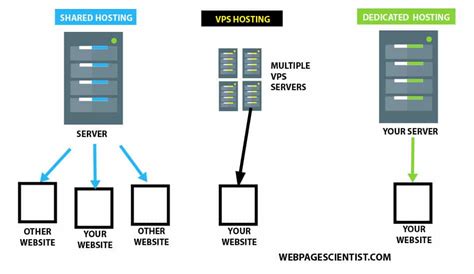Introduction
In this modern era of technology, web hosting plays a vital role in the online world. Different types of web hosting services are available, and each has its own benefits and drawbacks. One of the popular types of web hosting is virtual private server shared hosting. In this article, we will discuss what virtual private server shared hosting is and how it works.
What is Virtual Private Server Shared Hosting?
Virtual Private Server (VPS) shared hosting is a type of web hosting where multiple websites are hosted on a single physical server. Each website is allocated a specific amount of server resources, such as CPU, RAM, and disk space. However, the resources are shared among all the websites hosted on the server.
How Does Virtual Private Server Shared Hosting Work?
In VPS shared hosting, the physical server is divided into multiple virtual servers, each of which is dedicated to a single website. The virtual servers are isolated from each other, and each website is allocated a specific amount of server resources. This means that if one website on the server experiences a spike in traffic, it will not affect the performance of other websites on the server.
Benefits of Virtual Private Server Shared Hosting
One of the main benefits of VPS shared hosting is the cost savings. Since multiple websites are hosted on a single physical server, the cost of buying and maintaining the server is shared among all the websites. This makes VPS shared hosting an affordable option for small and medium-sized businesses. Another benefit of VPS shared hosting is the scalability. As your website grows, you can easily upgrade your hosting plan to a larger VPS or a dedicated server. This means that you can easily accommodate the increasing traffic on your website without experiencing any downtime or performance issues.
Drawbacks of Virtual Private Server Shared Hosting
One of the drawbacks of VPS shared hosting is the limited resources. Since the resources are shared among all the websites on the server, there is a limit to the amount of traffic and data that your website can handle. If your website experiences a sudden spike in traffic, it may affect the performance of other websites on the server. Another drawback of VPS shared hosting is the lack of control. Since the physical server is managed by the hosting provider, you have limited control over the server settings and configurations. This may be a concern if you have specific requirements for your website.
Conclusion
In conclusion, VPS shared hosting is a popular and affordable option for small and medium-sized businesses. It provides the benefits of cost savings and scalability, but also has some drawbacks such as limited resources and lack of control. Before choosing VPS shared hosting, it is important to evaluate your website’s requirements and choose a hosting plan that meets your needs.
